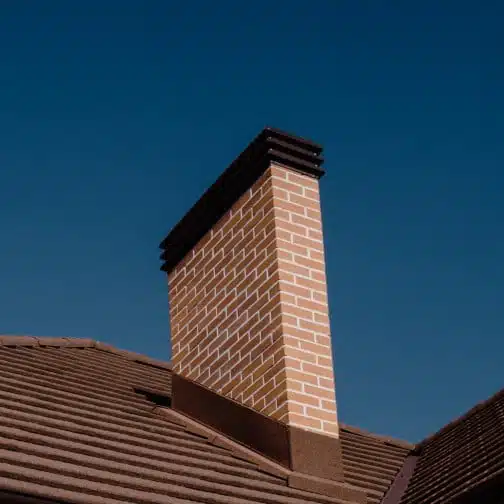chimney FAQ
How Often Should You Clean Your Chimney?
Short Answer: The frequency of chimney cleaning largely depends on usage. As a rule of thumb, the National Fire Protection Association recommends an annual inspection and cleaning. However, frequent use or burning certain types of wood may necessitate more frequent cleanings.

The warmth and coziness of a fireplace are undeniably comforting, especially in colder months. But to ensure that this comfort doesn’t become a safety hazard, regular chimney maintenance is essential. This blog post is here to guide homeowners through the nuances of chimney cleaning, answering the often-asked question: how often should you clean your chimney
Understanding Your Chimney
A chimney is not just a structure; it serves as a conduit for hot flue gases or smoke from a boiler, stove, furnace, or fireplace, to the outside atmosphere. Neglecting regular chimney cleaning can lead to several risks. These include potential chimney fires due to the buildup of creosote, harmful emissions into your home, and inefficient heating. Chimney cleaning involves removing soot, blockages, and built-up creosote from the flue lining, inspection for damages, and ensuring safe operation of your fireplace or stove.
Factors That Influence Chimney Cleaning Frequency
While chimney cleaning is universally necessary, the frequency depends on various factors.
- Type of Fireplace: Different fireplaces have varying demands. Wood-burning stoves, for instance, produce a lot of smoke and, by extension, soot and creosote. Gas fireplaces, conversely, burn cleaner and might require less frequent sweeping. Coal and pellet stoves each come with their own set of considerations too.
- Usage: The amount you use your fireplace or stove is directly proportional to the cleaning needs. A rarely used fireplace might get away with less frequent cleaning, but if you’re using your fireplace or stove daily in the winter, it will accumulate soot and creosote more rapidly, necessitating more frequent cleaning.
- Wood Type: The type of wood you burn impacts the level of creosote buildup. Hardwoods like oak, ash, or birch are preferable as they burn hotter and cleaner. Soft, resinous woods like pine can lead to rapid buildup of creosote, demanding more regular cleaning. Additionally, ensure the wood is well-seasoned (dry), as burning green (wet) wood also contributes to creosote buildup.
Recommended Chimney Cleaning Frequencies
The National Fire Protection Association (NFPA) standard 211 says, “Chimneys, fireplaces, and vents shall be inspected at least once a year for soundness, freedom from deposits, and correct clearances.” Cleaning, maintenance, and repairs should be done if the inspection calls for it. In certain cases, more frequent cleaning may be necessary. For instance, if you use your fireplace as a primary heat source or burn a lot of unseasoned wood, biannual cleaning might be required.
Signs That Your Chimney Needs Cleaning – Expanded
Recognizing the signs that your chimney needs cleaning is vital for maintaining a safe and healthy home. Here are some clear indicators that your chimney might require attention:
- Visible Creosote Buildup: Creosote, a byproduct of burning wood, accumulates on the inner walls of your chimney and appears as a black, oily residue. If you see over 1/8″ buildup, it’s a clear sign you need a chimney sweep.
- Unpleasant Odors: A well-maintained chimney shouldn’t smell. If you notice an unpleasant, burnt wood smell coming from the fireplace when it’s not in use, it could indicate a buildup of soot and creosote.
- Smoke Intrusion: Smoke should go up the chimney, not into your home. If you notice smoke in your living area when the fireplace is burning, it may suggest a blocked or partially blocked chimney, necessitating immediate cleaning.
- Poorly Burning Fire: If your fire is struggling to ignite, or keeps going out, it might mean your chimney is not properly drawing smoke out, indicating a potential blockage.
Remember, even if these signs are not apparent, regular maintenance as per the NFPA’s recommendations is vital for the long-term safety and efficiency of your chimney.
Professional vs. DIY Chimney Cleaning
When it comes to chimney cleaning, you might be contemplating whether to hire professionals or to do it yourself. Both options come with their own pros and cons. DIY chimney cleaning could save you money, but without the right tools and safety measures, it can be a messy and risky endeavor. On the other hand, professional chimney sweeps have the necessary equipment and experience to do a thorough job safely. If you suspect structural issues or have a particularly tall chimney, it would be safer and wiser to call in professionals.
Conclusion
Regular chimney cleaning is crucial to ensure the safety and optimal operation of your fireplace. It’s advisable to develop a maintenance schedule based on your usage, the type of fireplace, and the kind of wood you burn. Remember, when in doubt, don’t hesitate to reach out to local professionals for a thorough chimney inspection.
